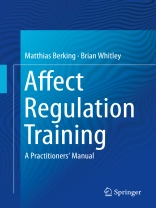Emotion Regulation is currently one of the most popular topics in clinical psychology. Numerous studies demonstrate that deficits in emotion regulation skills are likely to help maintain various forms of psychological disorders. Thus, enhancing emotion regulation has become a major target in psychotherapeutic treatments. For this purpose, a number of therapeutic strategies have been developed and shown to be effective. However, for practitioners it is often difficult to decide which of these strategies they should use or how they can effectively combine empirically-validated strategies. Thus, the authors developed the Affect Regulation Training as a transdiagnostic intervention which systematically integrates strategies from cognitive behavior therapy, mindfulness-based interventions, emotion-focused therapy, and dialectical behavioral therapy. The effectiveness of ART has been demonstrated in several high-quality studies.
Cuprins
Emotion Regulation and Mental Health.- ART Development Model of Emotion Regulation Deficits.- Use of affect regulation training as a psychological intervention.- Guidelines for effective delivery of affect regulation training.- Training format and logistics.- ART module one- introduction and psychoeducation.- ART module two- muscle and breathing relaxation.- Module three- psychoeducation part II (The importance of regular practice).- Module four – nonjudgemental awareness.- Module five- acceptance and tolerance.- Module six- compassionate self-support.- Module seven- analyzing emotions.- Module eight- modifying emotions.- Module nine- Additional practice using ART skill #6 (Analyzing Emotions) & ART Skill #7 (modifying emotions) with common challenging emotions.- Program evaluation, efficacy findings, and future opportunities.- closing words.
Despre autor
Dr. Matthias Berking is a Professor for Clinical Psychology and Psychotherapy at the University of Marburg/Germany. He is also a licensed psychotherapist trained in a wide range of empirically-validated interventions. In the past decade, Dr. Berking has focused on clarifying the relevance of emotion regulation skills for the development and maintenance of mental disorders. He has published numerous research articles and books on this subject and has run several large clinical trials evaluating interventions that aim to enhance emotion regulation skills in clinical and at-risk populations. He lives in Marburg, Germany, with his wife and three children. Brian Whitley, M.A. is a Licensed Marriage and Family Therapist with a counseling practice in Irvine, California. Brian has a unique background with 11 years of experience as a police officer. As a former police officer, Brian actively participated in several domestic violence intervention programs and shared his knowledge of domestic violence with others including medical students, law enforcement, and psychology graduate students. Brian now uses his background to assist other officers to manage the stressors of law enforcement more effectively. He lives in Orange County, California with his wife and two children.












